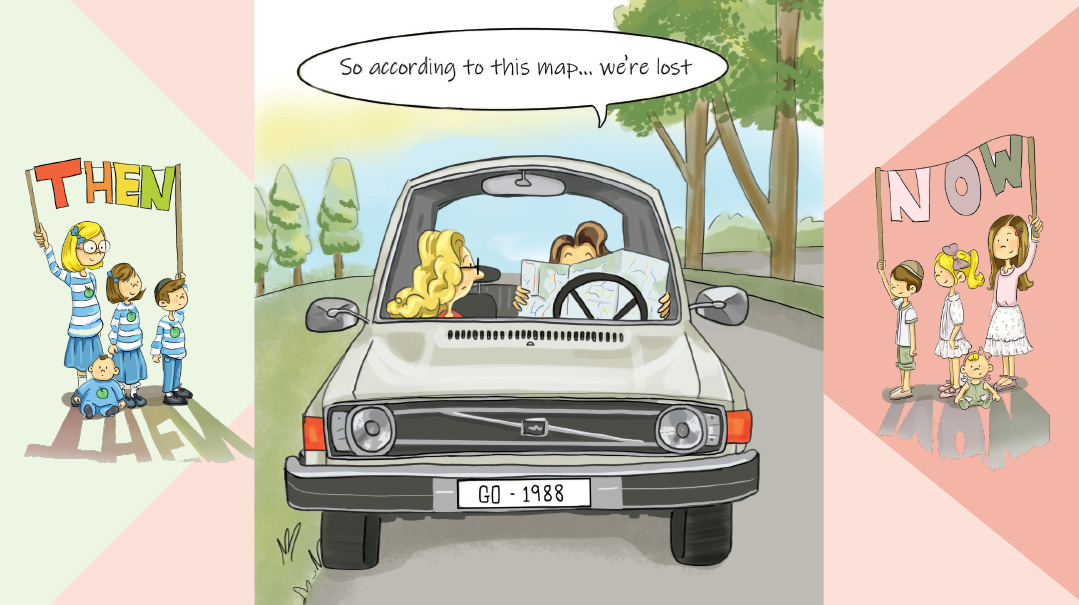Swimming Upstream

Does mainstreaming work? Three mothers share their struggles and successes

It works — if you work
Danny’s Story
When my mother came for Danny’s bris and told me he was “stiff,” I laughed it off. He was an exceptionally easy baby; I had to wake him to feed him.
But that should’ve been a red flag.
When Danny was a few weeks old, my nephew — a newlywed with no kids — visited and held the baby. “Wow,” he said, “this baby’s so stiff.”
That should’ve been a red flag too — he had no experience with babies, but even he noticed.
Then, when Danny was eight weeks old, I hosted my cousins for Pesach. After Yom Tov, my cousin met my mother. “What’s wrong with Danny?” my cousin asked her. It was that obvious.
So I called the Department of Health. They evaluated Danny and determined that he was eligible for Early Intervention. By the time he turned three, he was getting 12 to 14 hours weekly of PT, OT, speech therapy and developmental intervention. That’s a lot of therapy for a little kid. At one point, Danny’s non-Jewish therapist commented that I “must be praying very hard because he’s doing so well.”
I retorted that it wasn’t my prayers, maybe his grandmother’s. I was way too overwhelmed to daven much.
Eventually, Danny received a diagnosis of mild CP (cerebral palsy). When he turned three, he aged out of Early Intervention and the Board of Education placed him in a special-ed school. They gave him so much there, and he made tremendous gains. At that point there was no question that I wanted him in a special-ed environment: He was too young to know the difference, and it was the time to give him everything we could. I really tried to do that; I even worked with the school to launch an integrated program, so Danny had typically developing peers in his class. Although most kids start school at five, I kept Danny back a year so he could continue to gain from the special-ed setting.
But when he turned six, it was time for him to start school. And I wanted him to go to a yeshivah.
We came up with a plan: Danny would attend yeshivah with a shadow from 9:00 to 10:30 every morning. He would be integrated for davening and alef-beis, and he would benefit from the social interaction, too. For the rest of the day he went back to the special-ed class so he could acquire the skills and therapy he needed. This system worked phenomenally well, and showed us that he could manage in a mainstream school setting. Starting from first grade, we mainstreamed him for the full morning. For the afternoon (English), he’s in a self-contained class within the same school.
It’s not perfect. In a special-ed classroom, kids lose out on important learning like parshah, Yamim Tovim, and brachos. They also have no typically developing peers to learn from. (Children with mild developmental delays gain tremendously from spending time with typically developing peers. It’s a huge chesed when schools allow mainstreaming.) But in a mainstream classroom, the language demands aren’t geared toward developmentally delayed kids, and the social demands become more and more complex as time goes on. The older Danny got, the more support he needed to make it work.
So we supported him. With therapists, I found that you get what you pay for: private therapy was on a different level than government services. I paid for hours and hours of private therapy, which is typically billed in the ballpark of $150 an hour. There were times when I considered moving him back to a special-ed setting, which would be so much more targeted to his needs, and where he wouldn’t need all these privately paid aides, shadows, tutors and therapists. But I wanted him to be with typical peers and to identify as a yeshivah kid, as expensive and overwhelming as it all was. Some years were harder than others: Some rebbeim “got” him better than others, and some developmental stages were more intense. But overall, for us and for Danny, mainstreaming has been a success.
Mainstreaming worked because we worked. You can’t expect to mainstream your child successfully by just putting him on the bus every morning and expecting the school to handle it. It’s your kid, it’s your job. If the school insists that he needs more reading help in order to function in class, you have to provide it. If there’s a rebbi who can’t handle him and wants him to start the day at 11:30, you have to accommodate that. It’s up to you to make it work.
I’m a very active and involved parent, and Hashem helped us access the right schools, therapists and resources. When I advise other parents of children with special needs, I always tell them that they can’t mainstream their kids and think their job is done. I don’t work, but my days are filled with managing Danny’s “program.” There are meetings, phone calls, taking care of thousands of details.
And thousands of dollars. Mainstreaming costs a lot of money. I know people who refinanced their house to have the cash they needed.
Both my parents passed away shortly before Danny’s bar mitzvah. Milestones are hard — they’re when reality hits, and I didn’t have the emotional energy to make a big affair. In our community the classmates of the bar mitzvah boy don’t attend the bo bayom — the school holds a separate event in honor of the bar mitzvah boy. I asked Danny’s menahel if our family and close relatives could attend the school event as well, so I could gracefully opt out of making a separate affair.
It was a beautiful bar mitzvah. Danny’s rebbi was there, his menahel was there — all the people who had brought him to this place and time. There was music, and each of Danny’s classmates took a turn dancing with him in the middle of the circle. Danny’s Chumash tutor insisted he say a pshetl; she procured one, simplified it, and taught it to him. He spoke beautifully, as poised and articulate as any bar mitzvah boy. It was at that moment that I knew we’d succeeded, that Danny had forever outgrown a special-ed environment. Although Danny will never be “the same” as all the other kids, I knew then that all our effort, tears, and tefillos were worth it.
What We Learned
- I couldn’t have managed without my husband’s support. I help a lot of parents and I see a pattern: the ones who work as a team, have a much easier time. The challenge is too overwhelming to handle alone.
- Remind yourself all the time that if Hashem gave you this, you can handle it. I do get upset, feel down, cry; but I try to remind myself Hashem wants it this way.
- The secret ingredient to successful mainstreaming is money. A child with special needs cannot be mainstreamed without comprehensive support. I spend about $115,000 per year on Danny’s services. I well realize that’s far beyond the capacity of most parents, so it’s important to educate yourself about the options available to you.
- In some states, the Board of Education will cover a portion of the costs. A good private insurance plan will cover a lot of therapy costs, too. There are lawyers who specialize in helping families access the educational and health benefits they’re entitled to. Prioritize whatever personal funds you do have available for your child’s most important needs. It feels overwhelming, and it is. But it can be done.
- Speak up. Advocate for yourself and your child. Don’t expect the school to do it for you. Be assertive about your needs. There are people out there who really care. With Hashem’s help, you’ll find them.
What’s the measure of success?
Shuly’s Story
T
he morning Shuly turned 13, I wished her a happy birthday.
“Not happy, Ma,” she said, “just birthday.”
That’s when I knew something needed to change.
She’s cognitively limited and has an autism diagnosis, but the reality is much more complicated. She has cognitive, social, and motor impairments. Still, we did everything we could for Shuly: We sent her to a special-ed preschool, then set her up in a mainstream school with every support necessary for her to succeed.
And Shuly did succeed: She succeeded in remaining in a mainstream setting that was far beyond her level without interfering with the progress of the class. She succeeded in gaining basic reading and writing skills, and even some math and Chumash. She was mainstreamed, she was included. She’d made it.
But then on that unhappy birthday in seventh grade, I looked at Shuly and I saw a girl who spent most of the day being pulled out of class to work with tutors or therapists. When students were assigned partners for a project, Shuly was added to a group as a third. She had some Chumash skills, but no life skills. She had classmates, but no friends. She was in a mainstream classroom — but she didn’t belong there.
The principal disagreed. “Shuly’s not just your daughter, she’s our student,” she insisted. “We’ll do whatever it takes. We’re committed to Shuly’s success.”
Shuly’s success. With intense, sustained effort, endless siyatta d’Shmaya, and at a huge financial cost, Shuly had “succeeded.” Right? Well… actually, what exactly is the measure of success? Is simply being in a mainstream classroom the definition of success? Or could Shuly have her own definition of success?
Everyone thought we were crazy for moving Shuly to a special-ed program.
“Mainstreaming is the goal,” my friend insisted. “All the parents in the special-ed program wish their kid could be in a mainstream class like Shuly!”
But we weren’t so sure. For seven years we’d paid tutors, therapists, and aides to prop Shuly up so she could “succeed” in a mainstream classroom. In exchange, she’d received a fractured education: She’d learned some math, by missing handwriting, and she could read pretty well, since her reading tutor had pulled her out every day during science or social studies. And while she’d picked up some of the curriculum, there’s an entire “embedded curriculum” she’d missed out on: Organization. Accountability. Decision-making. And the incredibly nuanced social skills.
Besides, Shuly was very, very lonely.
We were lucky: We didn’t have to send Shuly to public school. Instead, in eighth grade Shuly began attending a self-contained class that is part of a larger special-ed program housed in another school. The program is fantastic, and Shuly has a curriculum individualized to her level and needs. For the first time in her life, she’s developing her executive functioning skills to age level. For the first time in her life, she’s developing independence and responsibility. For the first time in her life, Shuly has friends.
There’s a catch, of course. There are limited hours in the day, and Shuly’s own energy and effort are naturally limited. Her new curriculum is designed to give her social skills, language skills, life skills, and basic academics. There’s very little time spent on limudei kodesh. Whatever she learned through seventh grade is going to have to suffice for now.
There’s always going to be a trade-off. For years, Shuly was in a strong mainstream environment and received a regular Bais Yaakov–style education, but she felt like she didn’t belong, didn’t retain much, and lost out on life skills. Now she’s gaining all the skills she needs to be independent and responsible, and like every teenage girl is thrilled to have real friends, but she’s losing out on the limudei kodesh curriculum.
We wouldn’t change it, though. Those years were crucial in forming her identity — a strong, integrated Jewish identity. She can read and write in Hebrew, can read and translate Chumash to a degree, is familiar with the parshah and the minhagim of the Yamim Tovim. She identifies as a Bais Yaakov girl and never doubts her place in our family and community.
The decision to mainstream Shuly was tough, and the decision to move her to the special-ed program was even tougher. In fact, every step of the way has been tough. But when it feels hard, we look at Shuly. She faces failure at every turn, but she never gives up. Our mantra is, if Shuly can do it, we can do it.
Maybe that’s the measure of success.
What We Learned
- We always viewed our child as our responsibility and our privilege. We personally took responsibility to develop a support system for Shuly — aides, tutors, therapists, whatever she needed — as well as to create an appropriate curriculum. That attitude was critical in empowering so many amazing providers to partner with us in helping Shuly flourish.
- The mainstream school that Shuly attended through seventh grade was extremely welcoming and supportive, acting as true partners for Shuly’s best interests.
- When Shuly was ten, we paid $15,000 for an extremely comprehensive neuropsychiatric evaluation. It was worth every penny: We gained a tremendous amount of knowledge and insight, and the neuropsychiatrist provided invaluable guidance and advice for several years.
- I couldn’t have managed without the partnership of my husband. It’s a lonely, overwhelming journey, and support is so important. Spouses, parents, siblings — take note.
Never Stop
Yitzy’s Story
Y
itzy’s upsheren was the worst day of my life.
They cut off his long, gorgeous hair, and suddenly he wasn’t a baby anymore. Now he was a boy — a boy who couldn’t talk and wasn’t anywhere near ready to be toilet-trained. He refused to touch the honey, couldn’t chant tanu rabbanan, couldn’t read the alef-beis or do anything his brothers had done at their upsherens. Reality hit: He had an alphabet soup of diagnoses, a list longer than his beautiful curls had been. When we left the cheder with its alef-beis and Torah songs, I knew he wasn’t coming back. Yitzy needed a special education environment, and in our community, that meant public school.
The special-ed program taught academic skills, but slowly — Yitzy needed to be coached through every detail of the process. Mostly, though, it focused on life skills, like how to answer simple questions, toilet training, and playing with friends. These skills were important; they’d enable Yitzy to become as independent as possible. But, Yitzy wasn’t learning parshah, alef-beis, or brachos. Life skills were important, but… wasn’t Yiddishkeit important too?
So we got him a tutor. He learned alef-beis. He learned Chumash. He learned Rashi. He had a parshah sheet every Friday night just like his brothers. Still, we doubted ourselves. It was a struggle for Yitzy to do so much. It was a struggle for us to keep it all going.
But we also saw that children with special needs have a unique drive for spirituality. He was struggling to learn to tie his shoes and do math, but he loved the time he spent with his tutor (to this day she means so much to him). It gave him the strength to struggle though everything else.
I made peace with the fact that our son was not in a yeshivah — or at least, I understood why it was necessary. But Yitzy didn’t. He wanted to go to yeshivah like his brothers. For the entire year of first grade, he went to school kicking and screaming. What could I tell him? Only what I kept telling myself: This was his shlichus. This is where Hashem wanted him to be.
When Yitzy outgrew what a female tutor could offer him, my husband took over. By seventh grade, Yitzy was learning Mishnayos. We never said, “It’s too hard.” We never said, “This far and no further.” As long as he pushed himself because this was what he wanted, we never stopped him.
When Yitzy turned 12, he announced that for his bar mitzvah he wanted to do everything. Everything. Just like his brothers.
Everything is a lot. Everything is learning a pshetl in Yiddish. Everything is leining part of the parshah. Everything is leining the haftarah, and giving a speech, too.
We never stopped him before and we weren’t going to stop him now. He did it. He did everything.
Yitzy’s bar mitzvah was the best day of my life. I cried then, just like I’d cried at his upsheren. But now I wasn’t crying for what he couldn’t do. I was crying for what he could do.
And then Yitzy decided that he wanted to go to yeshivah for high school.
This wasn’t just a matter of Yitzy pushing himself. This meant we’d have to find a regular mainstream yeshivah that would accept him and join our struggle. Incredibly, we did find such a yeshivah — a small, warm environment in another city.
Until high school, Yitzy had been in a fully supportive environment: a special-ed setting, OT, speech therapy, aides, IEPs, the works. And now we were sending him out of town to a regular yeshivah. To live in a dorm! We didn’t know if it would work. We made an agreement with the school that if it didn’t work, we’d bring him back home.
In the beginning, there was trouble. It was a new, unfamiliar setting. Yitzy didn’t always know what was expected of him. He often became too loud in class. He was highly emotional, often overreacting to little things, and he struggled to regulate himself. His table manners were lacking, but he’d get upset if another student corrected him. He needed direction about when to do his laundry and shower, but he reacted negatively to any help.
The rosh yeshivah and rebbeim were angels. We traveled to meet with them so we could all help Yitzy succeed. We showed them that we would support them to make it work, and they reciprocated by supporting Yitzy so it could work. There was a strong trust between us. We were working together. We kept in close contact with the teachers and principals and bochurim who were in charge of him in the dorm. They knew never to hesitate to call us and to “say it like it is,” so we could find a solution together. We also had a therapist spend some time with him once a week to help Yitzy settle in.
Eventually things settled down: Yitzy was learning well and his behavior was much more socially appropriate. The bochurim befriended Yitzy and supported him. The rosh yeshivah told us that he felt Yitzy’s presence was having a positive effect on the bochurim. Yitzy’s love for everyone, his ready smile and sincere greetings found his way into their hearts.
With G-d’s help, the yeshivah setting was a success, but it only worked because of all the hard work that had come before.
It had been with great reluctance that we placed him in a secular school environment, but Yitzy was able to succeed in a mainstream setting because he’d spent so many years in a special-ed setting. Those years had given him the life skills, social skills, and independence to make mainstreaming possible.
We’d been reluctant to overload Yitzy with tutoring after school, but Yitzy was able to succeed in yeshivah only because of the time spent with the tutor. Those hours gave him the Yiddishkeit skills to make yeshivah life productive.
We’d never wanted to tell Yitzy to stop, and that’s why he hasn’t.
What We Learned
- Daven. With tears.
- Develop a relationship with the school and work hand-in-hand with them. Be immediately responsive to every request for support. Be there for them the way you want them to be there for you.
- Be completely honest with the school about your child’s needs. Don’t try to pretend he’s “more normal” than he is. It will only backfire and your child will lose out.
- Make sure your child is up to par academically so he can function in a mainstream classroom. If your child can’t learn or participate in a mainstream classroom, there’s no reason to put him there.
- A therapist told me that more than any other variable, the degree of the parents’ effort is the factor that determines if the child will succeed.
(Originally featured in Family First, Issue 657)
Oops! We could not locate your form.













